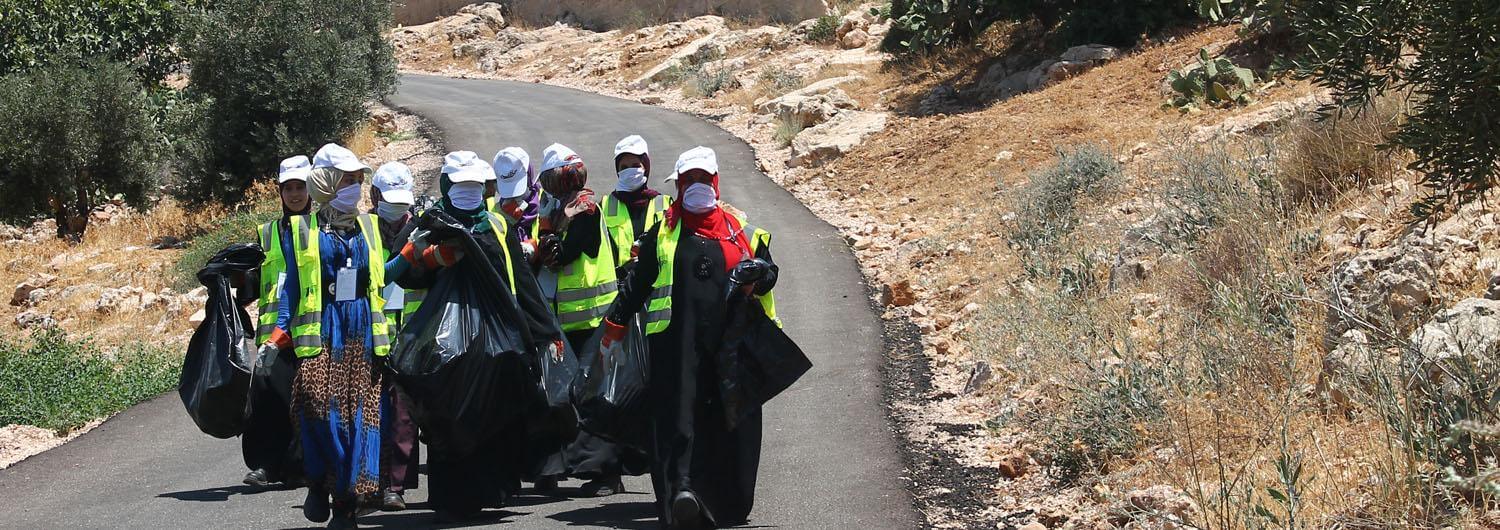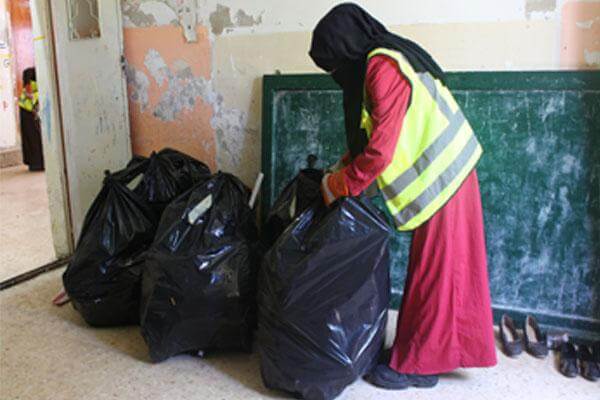Stories
Keeping cities clean: Women refugees working to benefit their communities in Jordan

More than 1.000 women workers in Irbid, Jordan benefit for this project.

Driving through districts of Irbid governorate in northern Jordan, it is striking that organized groups of women line the roads proudly picking up pieces of trash left behind by many. The women are of various age groups, all cooperating with a mission to clean up the city.
Formed in March 2017, Action Against Hunger’s local community cooperative project has been managing solid waste around Irbid governorate, while employing Jordanian and Syrian women residing there. The project, funded by German International Cooperation (GIZ) is part of a larger livelihoods programme, the Cash for Work scheme, which aims to increase short and long term employment opportunities for both vulnerable Jordanians and Syrian refugees in the solid waste management sector while strengthening local cooperatives.
In Irbid, such as in all municipalities in Jordan, solid waste management is a major issue due to the lack of financial resources, distance from landfills and lack of waste recovery. With the current waste production of 990t/day and a growing population, solid waste is having a critical effect on the ecosystem, biodiversity and air pollution.
The programme currently benefitting 1,000 workers in Irbid, is also securing work permits for the Syrian workers along with the provision of social security. The youth, women and men, collect solid waste from different districts in Irbid and then engage in the sorting and separation procedure at the Local Cooperative center, where the collected material is separated for either recycling, reusing or selling.
“For the women participation, the main challenge we faced was gaining acceptance from the community due to cultural constraints around working women and the solid waste management sector in general,” said Sajeda Saqallah, Food Security & Livelihoods Programme Manager at Action Against Hunger in Irbid.
Obtaining the acceptance of their community, was a major challenge that the women faced before joining the programme. Due to cultural stigmatization of the solid waste management sector, the community and families were discouraging the women to partake in this sector, although a need for income generation is high on their agenda.
By partnering with the local cooperatives, a trusted source among the community, Action Against Hunger emphasized its efforts on behavioral change and community mobilization. Awareness sessions on both solid waste management and keeping the environment clean, door to door meetings in the different districts and training both the local cooperatives and the workers in the field, were among the initial activities of the project to gain the support of families and the community at large.
The project was tailored to best suit the women’s schedules and convenience: their shifts start from morning until noon, the women remain among other women in groups, and the work would be mainly in smaller streets instead of main roads.
The women work for 50 days, earning 500 JD ($700) which is a significant sum of money, particularly for many who are the heads of their households.
After community based activities, and understanding the importance of the programme, families supported the females to work in the programme.
“My husband was killed in Syria, and I escaped to Jordan with my five children. It’s my duty to meet the needs of my family, to make sure my children are healthy and can stay in school. This opportunity is giving me the income to do that,” said Jamileh, a Syrian refugee residing in Irbid who has been part of Action Against Hunger’s programme for two months.
As 20 per cent of Syrian refugees in Jordan reside in Irbid governorate, many tensions are apparent among the host communities and refugees due to an increased pressure on resources and employment opportunities.
To promote social cohesion and minimize social tensions, the programme has combined Syrian and Jordanian women in the same groups, working together towards a common goal.
“When I got to know the Syrian women, and their experiences I now understand the hardships they face here, and we must welcome them and reach out to help them and their children,” said Tamam, one of the women in the group.
Gaining an insight into the solid waste management sector, the women came to understand their role in the value chain and how they are able to legally collaborate with other parts of the value chain to create a win-win situation. The women have recently started taking the initiative and building a network for themselves, where they are managing to sell many of the items they’ve been collecting, and earning extra money.
“We are strong women, we team up together, improve our environment and improve our households,” said Tamam.
The groups comprise of women aged 20 to 50 collaborating together, sharing experiences and improving their livelihoods.
To ensure its sustainability, the programme will expand within Irbid governorate to also be implemented in Ramtha district and will continue until the end of 2017 to ensure community enhancement through sustainable livelihood creation, for refugee hosting communities in Jordan.
JOIN US
Donate now
Your donation will reach those who most need it
Become a member
Join the generation that can bring an end to hunger
Donate via SMS
send HAMBRE to:
- 28010(1.2€)
- 38010(6€)
- 38012(3€)
Full donation to our projects. Valid for Movistar, Vodafone, Orange and Yoigo